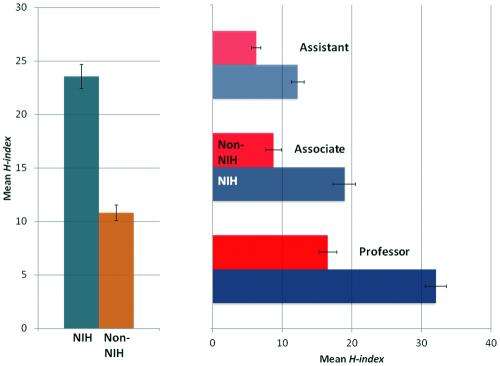Successful grant applications and scholarly impact in neurosurgery

Researchers have found a strong relationship between scholarly impact and success in receiving awards from the National Institutes of Health (NIH) among faculty in academic neurosurgery departments. Faculty members who receive NIH funding have higher research productivity and scholarly impact than those who do not receive funding. Progression through the ranks of assistant, associate, and full professor in neurosurgery departments reflects progressive increases in scholarly impact and, among faculty who receive NIH grant funding, the amount of funding. These findings are presented and discussed in "Assessing National Institutes of Health funding and scholarly impact in neurological surgery. Clinical article," by Peter F. Svider, M.D., Qasim Husain, M.D., Adam J. Folbe, M.D., William T. Couldwell, M.D., Ph.D., James K. Liu, M.D., and Jean Anderson Eloy, M.D., which is published today online, ahead of print, in the Journal of Neurosurgery.
The study was conducted by researchers at the Rutgers New Jersey Medical School, Wayne State University School of Medicine, and the University of Utah School of Medicine.
In this paper, the researchers state, "the NIH is the preeminent funding resource in the US, and grants from this organization are considered to be very prestigious." To examine whether there is a relationship between success in obtaining funding from NIH and an awardee's scholarly impact, the researchers used the h-index, an objective metric designed to quantify the value of an individual's scientific publications throughout his or her career.
The researchers searched the NIH RePORTER website for awards to neurosurgery departments made between October 2010 and March 2013. They identified 154 NIH-funded faculty members who were awarded 234 grants. Using the American Medical Association's FREIDA database and a random number generator, the researchers identified 166 neurosurgery faculty members without NIH funding for a comparison group. Faculty members' academic ranks and degrees were collected from their departmental websites. Scholarly expertise was determined by using each individual faculty member's h-index, which was calculated using the Scopus database.
Data on faculty members were first separated into two groups according to whether these persons received NIH funding during the study period. NIH-funded faculty members had a significantly higher mean h-index than unfunded faculty members; in fact, the mean h-index in the funded group was more than twice as high as the mean h-index in the unfunded group (p < 0.0001).
The researchers divided each of these two groups of faculty members into subgroups based on academic rank: assistant, associate, and full professors. They found that the h-index increased with each successive rank in both the funded and unfunded faculty groups (p < 0.05). When they examined how NIH funding related to academic rank in the group of NIH-funded faculty members, the researchers found that mean funding totals also increased with each successive academic rank (p < 0.05).
To determine if there were relationships between faculty members' highest academic degrees and both the h-index and NIH funding, the researchers separated the group of funded faculty members into three subgroups: faculty with the PhD degree, faculty with the MD degree, and faculty with both MD and PhD degrees.
The researchers' analysis showed that the mean h-index was highest among faculty members holding the MD degree alone, second highest among those with both MD and PhD degrees, and lowest in those with the PhD degree alone. The difference in mean h-indices between faculty members holding MDs alone and those holding PhDs alone was significant (p = 0.04).
When the researchers focused on NIH funding, they found that the mean NIH funding was greatest among faculty members holding the MD degree alone, second highest among those with the PhD degree alone, and lowest in those with both MD and PhD degrees. These differences were not statistically significant (p > 0.05)
Last, the researchers turned their attention to the relationship between h-indices and monetary values of NIH awards. The researchers found "a trend toward increasing h index with higher NIH funding range" (p < 0.05). This trend was statistically significant.
In summary, the researchers found a strong relationship between scholarly impact (as shown by h-indices) and NIH funding in neurosurgery departments. Faculty with NIH grant funding had greater scholarly impact than unfunded faculty. Higher-ranked faculty had greater scholarly impact and, if funded by NIH, greater amounts of funding. Interestingly, among NIH-funded faculty members, neurosurgeons with MD degrees alone possessed greater scholarly impact and greater amounts of NIH funding than their counterparts with both MD and PhD degrees and their colleagues with PhDs alone.
According to Dr. James K. Liu and Dr. Jean Anderson Eloy, from Rutgers University, the principal co-investigators of the study, "The h-index appears to be a reliable bibliometric to assess one's scholarly impact since this appears to correlate with one's ability to secure NIH funding in the field of academic neurosurgery. This finding is not surprising since the h-index appears to increase with one's academic rank. This metric may be a helpful adjunct in the academic promotion process."
More information: Svider PF, Husain Q, Folbe AJ, Couldwell WT, Liu JK, Eloy JA: Assessing National Institutes of Health funding and scholarly impact in neurological surgery. Clinical article. Journal of Neurosurgery, published online, ahead of print, November 12, 2013; DOI: 10.3171/2013.8.JNS13938













